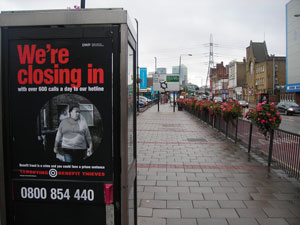 A poster warning about the risks of benefit claimants getting money to which they are not entitled
There is a cruel streak in contemporary politics, a meanness that has not often been so explicit. Since the youth riots of summer 2011 in London and elsewhere, the parade of hateful and vitriolic media messages have been amped up in many ways. Even strikers defending their pensions should, in the words of Jeremy Clarkson on the early evening BBC One Show 'be taken outside and executed in front of their families'.
A poster warning about the risks of benefit claimants getting money to which they are not entitled
There is a cruel streak in contemporary politics, a meanness that has not often been so explicit. Since the youth riots of summer 2011 in London and elsewhere, the parade of hateful and vitriolic media messages have been amped up in many ways. Even strikers defending their pensions should, in the words of Jeremy Clarkson on the early evening BBC One Show 'be taken outside and executed in front of their families'.
There had already been a continual parade of welfare scroungers, such as the stereotypical couple out of work or on incapacity benefits with double digit children in council housing in central London where notional property prices are highest, in the Daily Mail, The Sun and Daily Express. However, the characterisation of the young rioters and benefit claimants has surpassed all expectations.
Richard Littlejohn in the Daily Mail, portrayed the riots as the politics of envy from 'feral inner city waifs and strays' otherwise engaged in grand theft auto, dope and alcoholic consumption. He also argued that instead of 'clubbing these looters like baby seals', the police held back to just watch them plunder and arson.
Now a Social Attitudes Survey has confirmed what I've suspected for a number of years, that there is an increasing callous disregard for the poor in the UK which sometimes crosses over into hatred. We see this in comedy through the portrayal of poor people as hapless (feckless even), narcissistic and purely self-interested. Take Wayne and Waynetta Slob, for instance, or many of the characters of Little Britain. The humour behind such stereotypes is the kind that confirms prejudices, amplifies expectations and provides a neat fit with the caricatures of poverty found in the tabloids.
The survey, conducted by the National Center for Social Research, has been widely celebrated in the conservative broadsheets as an indication of a seismic shift in values. Janet Daley in the Daily Telegraph highlights that only 35 per cent now support a redistribution of wealth and 54 per cent consider unemployment benefits too generous. At a time when many households have been affected by higher taxes and frozen pay, the extent of such sentiments can be seen as a knee-jerk reaction to belt tightening by the majority.
The other elements of the survey do, however, indicate an alteration of mood from the attitudes of the late 1990s and early 2000s when a New Labour government promised to rectify decades of underfunding and a lack of investment in the infrastructures of a modern economy. The Liberal Democrats managed to increase their vote on the back of the sentiment that tax rises purely to boost spending on education and health coincided with the views of most UK citizens.
The supporters of such measures have dropped by roughly half to 31 per cent. In addition, the line between the state's responsibility and that of private citizens also seems to moving. Unemployment, homelessness, educational failure and even child poverty are increasingly regarded as the product of personal difficulties, not as social problems to be solved. One key feature of the survey is that 63 per cent blame child poverty on the incapacities of their parents, only drug dependence is seen as a more important factor.
Condescension turned to rage after the summer riots when hapless hoodies raided businesses for personal benefit or for the kick of confronting the police. They were certainly hapless, if not incompetent criminals, for many were easily identifiable afterwards. Ultimately, 1,715 people appeared in court and 315 were convicted by November, with many receiving disproportionately longer sentences compared to those not connected with the disturbance. All of this was egged on by the UK's political leaders.
As with child poverty, arranging a disturbance is also attributed to the failure of personal responsibility of the parents of those involved with a number of councils planning to evict the families of the convicted from council owned properties. Even well-behaved members of Occupy in London have been subject to a range of questionable attacks as dirty hippies, unsanitary protestors despoiling the streets of London and workshy youth who should get a job or go back to college.
In an era of major public spending cuts, even the traditional distinctions between deserving and undeserving poor are crumbling. Being poor now seems solely to mean being a drain on the public purse, not being vulnerable and in need of help and protection. Make no mistake, the endless line up of folk devils invoked, from feral yobs to workshy parents, will continue to diminish tolerance and this will be given a stronger material basis as more people are made unemployed and disposable incomes continue to fall.
Rate and Review
Rate this article
Review this article
Log into OpenLearn to leave reviews and join in the conversation.
Article reviews
Rather than address the real causes of criminality, the blame is shifted on to those who have no voice.